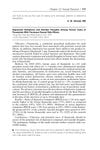 January 2013 in “Yearbook of Urology”
January 2013 in “Yearbook of Urology” Former finasteride users showed higher rates of depression and suicidal thoughts compared to those who never used it.
 May 1999 in “Drugs & Therapy Perspectives”
May 1999 in “Drugs & Therapy Perspectives” Finasteride helps increase or maintain hair in most men but can cause sexual side effects and should not be used by women, especially during pregnancy.
August 2021 in “Annales pharmaceutiques françaises” Topical finasteride at 0.25% is effective and has fewer side effects than oral finasteride for hair loss.
 43 citations,
July 2018 in “Journal of The European Academy of Dermatology and Venereology”
43 citations,
July 2018 in “Journal of The European Academy of Dermatology and Venereology” Finasteride and minoxidil mix works better for hair growth than minoxidil alone, with similar safety.
 38 citations,
June 2003 in “Journal of Investigative Dermatology Symposium Proceedings”
38 citations,
June 2003 in “Journal of Investigative Dermatology Symposium Proceedings” Finasteride effectively improves hair growth and slows hair loss in men with male pattern baldness.
 13 citations,
February 2007 in “British Journal of Dermatology”
13 citations,
February 2007 in “British Journal of Dermatology” EF and PXE not closely related.
 6 citations,
March 2018 in “Journal of Chromatography A”
6 citations,
March 2018 in “Journal of Chromatography A” New method accurately measures finasteride and M3 in urine, helping evaluate pharmacokinetics.
1 citations,
August 2022 in “Journal of Dermatological Treatment” Dutasteride is the most effective for hair loss but may cause sexual and mental side effects.
 August 2024 in “Australasian Journal of Dermatology”
August 2024 in “Australasian Journal of Dermatology” Finasteride users have a very low risk of mental health issues, but those with hair loss may have slightly higher anxiety and depression.
July 2024 in “Actas Dermo-Sifiliográficas” Finasteride and dutasteride do not significantly change beard thickness in men.
 April 2024 in “Dermatology reports”
April 2024 in “Dermatology reports” Dutasteride is more effective than finasteride for hair regrowth in male and female pattern hair loss, with similar side effects.
 December 2013 in “Reactions Weekly”
December 2013 in “Reactions Weekly” Some men taking finasteride for hair loss experienced anxiety, depression, and sexual problems, which sometimes continued after stopping the medication.
 May 2015 in “Journal of The American Academy of Dermatology”
May 2015 in “Journal of The American Academy of Dermatology” Finasteride for hair loss increases risk of sexual dysfunction in young men.
 April 2015 in “Reactions Weekly”
April 2015 in “Reactions Weekly” Finasteride toxicity information is limited, poor quality, and biased.
 December 2018 in “Evidence-Based Practice”
December 2018 in “Evidence-Based Practice” Topical minoxidil 1% and 2% are twice as effective as placebo for female pattern hair loss.
 8 citations,
April 2020 in “Facial Plastic Surgery Clinics of North America”
8 citations,
April 2020 in “Facial Plastic Surgery Clinics of North America” Minoxidil, finasteride, and low-level laser light therapy are effective FDA-approved treatments for hair loss.
 1 citations,
February 2022 in “JAMA Dermatology”
1 citations,
February 2022 in “JAMA Dermatology” Minoxidil and finasteride are FDA-approved treatments for male hair loss, but off-label use of oral minoxidil, dutasteride, and higher doses of finasteride and minoxidil is increasing.
 30 citations,
December 1999 in “International Journal of Dermatology”
30 citations,
December 1999 in “International Journal of Dermatology” Oral ivermectin effectively cured scabies with minimal side effects, and finasteride promoted hair growth in men with hair loss.
 22 citations,
August 2014 in “Clinical endocrinology”
22 citations,
August 2014 in “Clinical endocrinology” Taking finasteride for benign prostate hyperplasia may increase the risk of osteoporosis, especially at higher doses.
 2 citations,
April 2017 in “European Urology”
2 citations,
April 2017 in “European Urology” Using finasteride for hair loss or prostate issues does not significantly raise the risk of erectile dysfunction.
 31 citations,
June 2001 in “PubMed”
31 citations,
June 2001 in “PubMed” TrichoScan accurately measures hair growth and showed improved hair counts and thickness after finasteride treatment.
 April 2005 in “Aktuelle Dermatologie”
April 2005 in “Aktuelle Dermatologie” Shampoos have evolved to address individual hair and scalp needs, and treatments like Minoxidil and Finasteride help with hair loss.
 September 2004 in “PubMed”
September 2004 in “PubMed” Androgenetic alopecia, or hair loss, is influenced by hormones and genetics, and can be treated with medications like minoxidil, finasteride, or hormone therapy, with effectiveness evaluated after 6 months.
 May 2024 in “Journal of cosmetic dermatology”
May 2024 in “Journal of cosmetic dermatology” "Dutasteride 0.5 mg daily is the most effective treatment for male hair loss."
 63 citations,
August 2008 in “Journal of Cosmetic Dermatology”
63 citations,
August 2008 in “Journal of Cosmetic Dermatology” Cuscuta reflexa extract may help treat hair loss caused by hormones.
 11 citations,
February 2016 in “Current Medicinal Chemistry”
11 citations,
February 2016 in “Current Medicinal Chemistry” New treatments for prostate cancer and BPH show promise, including novel compounds that target hormone synthesis and response.
 5 citations,
November 2004 in “Japanese journal of geriatrics”
5 citations,
November 2004 in “Japanese journal of geriatrics” Male hormones can cause hair loss, but treatments like Minoxidil and Finasteride can help, and targeting TGF-B1 could be a future solution.
 6 citations,
July 2013 in “Acta Clinica Belgica”
6 citations,
July 2013 in “Acta Clinica Belgica” The document concludes that combination therapy is most effective for treating excessive hair growth in women with idiopathic hirsutism, and more research is needed to understand the condition.
 2 citations,
January 2004 in “Enshou saisei”
2 citations,
January 2004 in “Enshou saisei” Male pattern baldness is caused by certain cells in hair follicles and could potentially be treated by targeting a specific growth factor, TGF-β1.
 1 citations,
June 2012 in “Actas Dermo-Sifiliográficas”
1 citations,
June 2012 in “Actas Dermo-Sifiliográficas” Early and aggressive treatment of scarring alopecia is important to prevent further hair follicle damage.



























